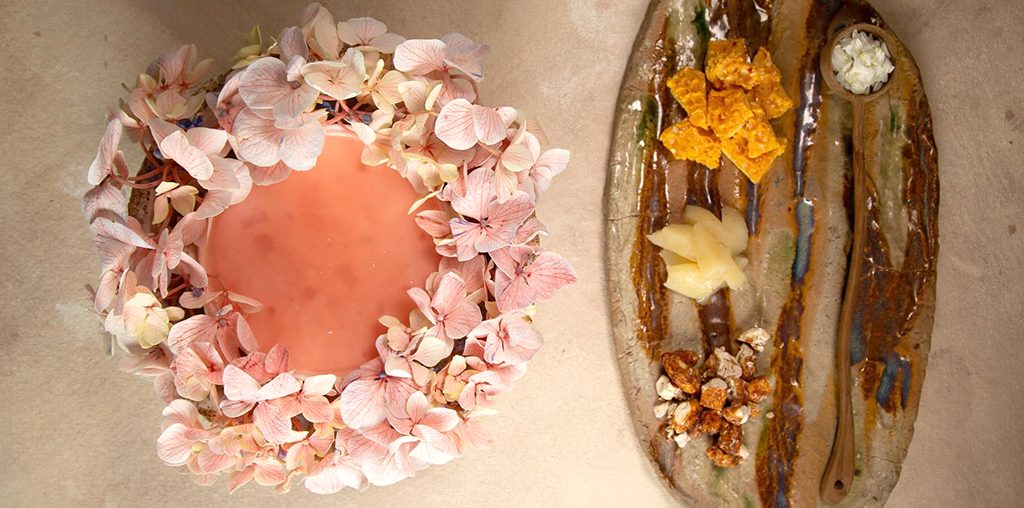
MAYTA BY JAIME PESAQUE: MORE MATURE THAN EVER
The growth is evident; it began with the change of location and now offers that encounter between the cook and the ingredients around the garden called Yachay.

The growth is evident; it began with the change of location and now offers that encounter between the cook and the ingredients around the garden called Yachay.
Written by Jimena Agois (IG @jimena.agois)
I don’t remember the first time I ate at Mayta restaurant, but I do remember the small place on Av. 28 de Julio and how Jaime Pesaque captivated us from the beginning with his flavor and Peruvian touches. I also remember the countless Sundays spent enjoying the food with family. Back then, no one could imagine everything happening in these 15 years. The evolution in the chef’s cuisine is unquestionable.
Ranked 41 of The World’s 50 Best 2024 and 10th on Latin America’s 50 Best Restaurants. The growth is evident; it began with the move to Av. La Mar is a space fitting for his cuisine, spacious and well-designed. It continued during the pandemic, with that encounter between the chef and the ingredients around his garden in southern Lima, in Ica, called Yachay. A moment of reflection that pushes him to explore, to take a step further, and propose a tasting menu around the products from that garden.
This 2024, he takes another step, expanding and looking at all of Peru, with its infinite diversity. Yachay is not enough and becomes just one part of the new Mayta menu, which evolves and takes you by the hand to explore ingredients and flavors from our country. Textures and temperatures alternate stews, highlight colors, are partly enjoyed with hands, and come with verbal instructions from the dining room staff, increasingly confident, guiding the diner in this round and solid, more mature experience.

One of the challenges restaurants face today is expectations. In an era of excessive information, the diner, long before arriving at the place, already has an idea of what will happen. Pesaque is a great chef—hardworking, ambitious, and creative. He has developed his own work lines and delved into others. He has been inspired and has inspired, and he continues to do so.
In this menu, there are changes for the better. The tubers that began the experience are transformed, and this time, they arrive first in a cylinder of arracacha with egg threads and tunta powder, also known as white chuño. The mille-feuille is no longer there, and instead, we have an elegant flower-crowned with pickled oca slices. The south is still present in this familiar step, four bites that come directly from the sea, where the scallop, razor clam, crab, and codium seaweed are presented in different flavors and textures: a whole journey of sensations, crunchy, moist, acidic, sweet. Tomatoes and Israel apples have replaced the eggplant that was so popular, there is a change of season, and that is what is available. A dish that evolves, adapts, and after several attempts finally joins this experience, where the broth from its juices arrives light and has a pecan emulsion that adds texture.

The squashes are already known: loche, macre, and load squash, a tasty dish that hugs and comforts. The same happens with the textures of corn, tarwi, and sacha inchi. Those bites that can be eaten with a spoon, and you don’t want them to end. We arrive at the Amazon with a dish of three river fish: paiche, carachama, and gamitana, the latter is less juicy than it should be and perhaps the weakest bite of the night. The veal rib with a perfect puree of broad beans and lima beans was another of our favorites and an excellent end to the savory tour.
The sweet world begins with a pre-dessert of moraya with golden berries and yacón. The first sweet of the night arrives: camu camu, stingless bee’s honey, cupuaçu, and macambo, fresh and tasty. We close the experience with a dessert of sweet corn textures and fake Andean cheese, which is remarkable. Richard Venegas’s incorporation into the team led by Santiago Vidal has been a great contribution, and the pairing, both with and without alcohol, created by Walter Salazar and his team stands out on this last visit.

Un espacio 2200 m2 para 300 comensales donde pueden disfrutar desde el café del desayuno hasta un cóctel para cerrar el día.
Leer másLes contamos cómo armar una tabla de quesos y fiambres que anime las reuniones pequeñas y más grandes.
Leer másEn el Día del Cebiche, esta es la pesca que recomiendan los chefs Coco Tomita y Anthony Vásquez, y la pescadora Karin Abensur.
Leer más



